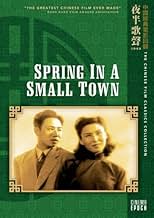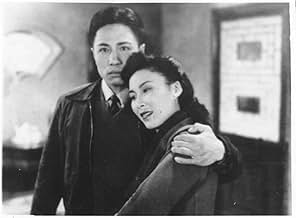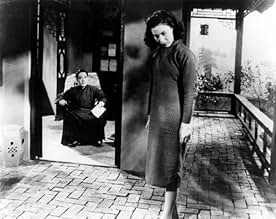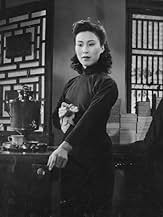IMDb RATING
7.3/10
3.6K
YOUR RATING
A lonely housewife finds her monotonous life altered when her childhood sweetheart returns to town.A lonely housewife finds her monotonous life altered when her childhood sweetheart returns to town.A lonely housewife finds her monotonous life altered when her childhood sweetheart returns to town.
- Awards
- 1 win total
- Director
- Writer
- All cast & crew
- Production, box office & more at IMDbPro
Featured reviews
"Spring in a Small Town" is a remarkable fusion of classic form and the convincingly real. It moves from its central character, Yuwen, who is isolated in a small town, and in an arranged marriage with an ill neurasthenic husband, Lyan; and moves too from a truly enduring acting job by Wei Wei as Yuwen.
The story revolves around memory: memory of love, and memory of a pre-war period of youthful promise. These moments of being are stirred to life by the visit of the husband's long estranged friend Zhang, who is now a city doctor. Zhang means renewed life and vigor at the desolate, war ruined estate of the noble Lyan, and love and passion to Yuwen, who happens to have been someone she once loved as a teen.
But Zhang's surprising appearance is more widening of vision than epiphanal. It's complicated by Yuwen's passionate desires and longings concentrated under the guise of romance, the doctor's scruples and detachment, her husband's illness, depression, and stoic passivity, and her sister-in-law's budding mutual relationship with Zhang. But there is no love triangle here, nor double love-triangle--something far more subtle is happening and it's happening in that whole arena suggestive of love and affection--one that extends into a range of human emotions, but is not romantic love itself.
Although there is clearly a patriarchal social world at work here, its oppressions are not exactly active in or bearing down on the two male and two female characters of this intimate drama. Each character has a kind of self-direction which comes from some inner sense of integrity, and acceptance of the life dealt them. They have deep emotions, but these are more felt than viewed. In other words, no one character dominates any other, so that each is free to call upon aspects of themselves which can result in self-determined responses and/or personal changes that are small but lasting adjustments.
The result is a world of stasis and intimacy which bears the physical-ness of the natural world. The characters seem to be as embodied as the stones of the ancient walls of the estate. They exist and move in a kind of equal world in which each senses the most minute emotion, movement, or thought in another--sometimes in soundless scenes. Honesty and simplicity arising from honoring the complexity of human-ness are what sets Fei Mu's film apart.
"Spring" is one of the most beautiful of all films because the things of beauty, sensuality, love, the natural world are more akin to hints than expressions. A breeze, spring sunshine, plants, the moon, water, fire are almost unnoticeably present, as are glimmering lights in an interior stillness. And all this bears more weight because of the period between war and change which seems to create a profounder environment. One in which the destruction of towns and persons is experienced in say the town's depopulation or the mild husband's bitterness and self-defeat. Yes, buildings and lives are equally vulnerable in Fei Mu's somewhat inconsolable world.
But "Spring" is as much about spring, as it is about the gravitas of war. Lyan's young sister Xiu has a youthful spontaneous presence which with all its trust, directness, driving sympathy pushes both her brother into re-connecting to memory, and her sister-in-law into and through the painful memory of Zhang's failure to be in love with her back then.
In the end, Yuwen may not be less alone, but she is more in sync with her husband's now awakened life and affection and more in touch with her own emotional life which was deeper than what she understood it to be. Dr. Zhang and Liyan do not answer her passions, but they have both contributed to her more certain grasp of them. There is a touch of sadness at end though, because the male social structures are still in place and Yuwen needs a fuller life--it's perhaps promised in her sister-in-laws embrace of all that must await both women.
The story revolves around memory: memory of love, and memory of a pre-war period of youthful promise. These moments of being are stirred to life by the visit of the husband's long estranged friend Zhang, who is now a city doctor. Zhang means renewed life and vigor at the desolate, war ruined estate of the noble Lyan, and love and passion to Yuwen, who happens to have been someone she once loved as a teen.
But Zhang's surprising appearance is more widening of vision than epiphanal. It's complicated by Yuwen's passionate desires and longings concentrated under the guise of romance, the doctor's scruples and detachment, her husband's illness, depression, and stoic passivity, and her sister-in-law's budding mutual relationship with Zhang. But there is no love triangle here, nor double love-triangle--something far more subtle is happening and it's happening in that whole arena suggestive of love and affection--one that extends into a range of human emotions, but is not romantic love itself.
Although there is clearly a patriarchal social world at work here, its oppressions are not exactly active in or bearing down on the two male and two female characters of this intimate drama. Each character has a kind of self-direction which comes from some inner sense of integrity, and acceptance of the life dealt them. They have deep emotions, but these are more felt than viewed. In other words, no one character dominates any other, so that each is free to call upon aspects of themselves which can result in self-determined responses and/or personal changes that are small but lasting adjustments.
The result is a world of stasis and intimacy which bears the physical-ness of the natural world. The characters seem to be as embodied as the stones of the ancient walls of the estate. They exist and move in a kind of equal world in which each senses the most minute emotion, movement, or thought in another--sometimes in soundless scenes. Honesty and simplicity arising from honoring the complexity of human-ness are what sets Fei Mu's film apart.
"Spring" is one of the most beautiful of all films because the things of beauty, sensuality, love, the natural world are more akin to hints than expressions. A breeze, spring sunshine, plants, the moon, water, fire are almost unnoticeably present, as are glimmering lights in an interior stillness. And all this bears more weight because of the period between war and change which seems to create a profounder environment. One in which the destruction of towns and persons is experienced in say the town's depopulation or the mild husband's bitterness and self-defeat. Yes, buildings and lives are equally vulnerable in Fei Mu's somewhat inconsolable world.
But "Spring" is as much about spring, as it is about the gravitas of war. Lyan's young sister Xiu has a youthful spontaneous presence which with all its trust, directness, driving sympathy pushes both her brother into re-connecting to memory, and her sister-in-law into and through the painful memory of Zhang's failure to be in love with her back then.
In the end, Yuwen may not be less alone, but she is more in sync with her husband's now awakened life and affection and more in touch with her own emotional life which was deeper than what she understood it to be. Dr. Zhang and Liyan do not answer her passions, but they have both contributed to her more certain grasp of them. There is a touch of sadness at end though, because the male social structures are still in place and Yuwen needs a fuller life--it's perhaps promised in her sister-in-laws embrace of all that must await both women.
This is a film about deep and unspoken human relationships.
Eventually they do become spoken, but is there a chance to change anything about the situation.
Originally made in Shanghai 1948 and quite free of propaganda the film introduces us to the Dai Family. There is still some weight about the history that surrounds the family. History usually has weight in Chinese literature and serious film.
A young married couple - Liyan, an invalid, and his wife Yuwen live in a once great family compound that is partially ruined.
A bright contrast is Liyan's young sister who cannot really remember the past of the family but accepts everything in quite a natural way. Her spirit is as bright as the other two are reserved.
Into this apparently stable world comes an unexpected visitor...
I ended up feeling quite sad - but definitely a superior film.
Eventually they do become spoken, but is there a chance to change anything about the situation.
Originally made in Shanghai 1948 and quite free of propaganda the film introduces us to the Dai Family. There is still some weight about the history that surrounds the family. History usually has weight in Chinese literature and serious film.
A young married couple - Liyan, an invalid, and his wife Yuwen live in a once great family compound that is partially ruined.
A bright contrast is Liyan's young sister who cannot really remember the past of the family but accepts everything in quite a natural way. Her spirit is as bright as the other two are reserved.
Into this apparently stable world comes an unexpected visitor...
I ended up feeling quite sad - but definitely a superior film.
For Romance's sake, as a married man. The following two films are recommended.
1. Brief Encounter by David Lean (1945), UK
Well, when a woman goes to a railway station, something may happen. And it happened! How she longed to be there, in a little tavern waiting for the man of her dreams. But she was married... the man was a stranger to the fantasizing woman
2. Xiao Cheng Zhi Chun by Fei Mu (1948), China
Well, when a woman goes to the market to buy fish, grocery and medicine, passing through the ruins of an ancient wall in a small town, there is much to think about, about the melancholy of her life, her sick husband in self-pity and lack of future...Just when a jubilant young doctor arrived, something happened... the doctor was a high school honey of the fantasizing woman
In both movies, from great directors of UK and China, the passion vs restraint was so intense, yet in the end the intimate feelings had not developed into any physical contacts. That leaves you with a great after-taste, sniffing it intensely without biting it.
1. Brief Encounter by David Lean (1945), UK
Well, when a woman goes to a railway station, something may happen. And it happened! How she longed to be there, in a little tavern waiting for the man of her dreams. But she was married... the man was a stranger to the fantasizing woman
2. Xiao Cheng Zhi Chun by Fei Mu (1948), China
Well, when a woman goes to the market to buy fish, grocery and medicine, passing through the ruins of an ancient wall in a small town, there is much to think about, about the melancholy of her life, her sick husband in self-pity and lack of future...Just when a jubilant young doctor arrived, something happened... the doctor was a high school honey of the fantasizing woman
In both movies, from great directors of UK and China, the passion vs restraint was so intense, yet in the end the intimate feelings had not developed into any physical contacts. That leaves you with a great after-taste, sniffing it intensely without biting it.
Very interesting to get this glimpse into China in the short interval after WWII and before the communists won the Civil War. We see the fashions of the period pre-communism and a story decidedly not in keeping with social realism or rosy propaganda; instead, these characters have real angst and it's a human tale ala Madame Bovary. The devastation of the country is mirrored in the ruins of the town and in the illness of a man (Yu Shi) living with his increasingly estranged wife (Wei Wei). She's dutiful to him, but the pair are no longer intimate or even in love. Enter her old lover (Li Wei), a doctor who somehow slipped away from her a few years ago, and an illicit love triangle secretly begins simmering.
I loved the first half of the film, where the conflict and desire is told through glances and silences, and it wasn't clear what would happen. Complicating matters (in a good way) is the presence of a cheery 16-year-old sister who is also a possible love interest for the doctor. The film is a little creaky but director Fei Mu gives us some wonderful shots along the old city walls, the breeze fluttering through the grasses as the lovers stir each other's desires. The pace bogs down a little bit as the characters search for resolution to the struggle, with various contemplations of withdrawal, suicide, and even murder. The lovers also go through cycles which represents their torment, e.g. in a moment of passion the doctor whisking the woman off her feet and into his arms, and in the very next, putting her down, walking out the door and locking it. In all of the melodrama it seemed to me the story-telling wasn't as clean as it could have been, and I wasn't as swept up in the emotions of the ending as much as a result. It's interesting to think about the understated emotion and restraint here as it compares to 'In the Mood for Love' (2000) though, and the two films might make an interesting double feature.
I loved the first half of the film, where the conflict and desire is told through glances and silences, and it wasn't clear what would happen. Complicating matters (in a good way) is the presence of a cheery 16-year-old sister who is also a possible love interest for the doctor. The film is a little creaky but director Fei Mu gives us some wonderful shots along the old city walls, the breeze fluttering through the grasses as the lovers stir each other's desires. The pace bogs down a little bit as the characters search for resolution to the struggle, with various contemplations of withdrawal, suicide, and even murder. The lovers also go through cycles which represents their torment, e.g. in a moment of passion the doctor whisking the woman off her feet and into his arms, and in the very next, putting her down, walking out the door and locking it. In all of the melodrama it seemed to me the story-telling wasn't as clean as it could have been, and I wasn't as swept up in the emotions of the ending as much as a result. It's interesting to think about the understated emotion and restraint here as it compares to 'In the Mood for Love' (2000) though, and the two films might make an interesting double feature.
Produced in 1948 prior to the Communist takeover in China, Spring in a Small Town is a lyrical depiction of the intense psychological rivalry between two friends for the love of one woman. Directed by Fei Mu and based on a short story by Li Tianji, the film dramatizes the emotional entanglement of four people, conveying an intense eroticism that is powerful and haunting. Dai Liyan (Shi Yu), and his wife Zhou Yuwen, magnificently portrayed by the alluring Wei Wei, live in his old family house with Liyan's teenage sister, Dai Xiu (Zhang Hongmei) and the family servant Lao Huang (Cui Chaoming). Because of Liyan's tuberculosis, they are forced to sleep in separate rooms. Yuwen is a loyal and devoted wife but is bored and prefers to spend her time embroidering or going for solitary walks along the top of the crumbling city wall.
When Zhang Zhichen (Li Wei), a boyhood friend of Liyan who is now a doctor arrives from Shanghai, it is revealed that Yuwen was his childhood sweetheart when she was only sixteen. The tension becomes palpable as each character is forced to hide their true self and feelings are expressed only with glances, body language, mannerisms, and silence. Zhichen's arrival brings a spark of life to the moribund household and soon all are taking walks together, singing songs, and playing games. The relationship between Yuwen and Zhichen slowly becomes rekindled and is crystallized at Xiu's 16th birthday party when both have too much to drink. When Yuwen cuts her hand on broken glass after a struggle with Zhichen, however, a distressing event occurs that transforms everyone's life.
Spring in a Small Town has an elegance and intimacy that I found lacking in the remake last year by Tian Zhuanghuang. By depicting events from Yuwen's point of view and adding a poetic voiceover, Mu's film brings us much closer to the characters. Spring in a Small Town did not receive immediate critical acclaim when it was released and Fei Mu was labeled a "rightist" and left for Hong Kong, never to make another film. The film only began to find its audience when the China Film Archive made a new print in the early 80s. Now many Chinese critics consider it the greatest Chinese film ever made. I certainly would not argue with that.
When Zhang Zhichen (Li Wei), a boyhood friend of Liyan who is now a doctor arrives from Shanghai, it is revealed that Yuwen was his childhood sweetheart when she was only sixteen. The tension becomes palpable as each character is forced to hide their true self and feelings are expressed only with glances, body language, mannerisms, and silence. Zhichen's arrival brings a spark of life to the moribund household and soon all are taking walks together, singing songs, and playing games. The relationship between Yuwen and Zhichen slowly becomes rekindled and is crystallized at Xiu's 16th birthday party when both have too much to drink. When Yuwen cuts her hand on broken glass after a struggle with Zhichen, however, a distressing event occurs that transforms everyone's life.
Spring in a Small Town has an elegance and intimacy that I found lacking in the remake last year by Tian Zhuanghuang. By depicting events from Yuwen's point of view and adding a poetic voiceover, Mu's film brings us much closer to the characters. Spring in a Small Town did not receive immediate critical acclaim when it was released and Fei Mu was labeled a "rightist" and left for Hong Kong, never to make another film. The film only began to find its audience when the China Film Archive made a new print in the early 80s. Now many Chinese critics consider it the greatest Chinese film ever made. I certainly would not argue with that.
Did you know
- TriviaVoted the best Chinese-language film of all time by the Hong Kong Film Academy in 2004.
- Alternate versionsThere is an Italian edition of this film on DVD, distributed by DNA Srl: " PRIMAVERA IN UNA PICCOLA CITTÀ (Spring in a Small Town, 1948) + LA DEA (The Goddess, 1934)" (2 Films on a single DVD). The film has been re-edited with the contribution of film historian Riccardo Cusin. This version is also available for streaming on some platforms.
- ConnectionsFeatured in Venice 70: Future Reloaded: Zhangke Jia (2013)
- How long is Spring in a Small Town?Powered by Alexa
Details
- Release date
- Country of origin
- Language
- Also known as
- Spring in a Small Town
- Production company
- See more company credits at IMDbPro
- Runtime
- 1h 38m(98 min)
- Color
- Sound mix
- Aspect ratio
- 1.37 : 1
Contribute to this page
Suggest an edit or add missing content











